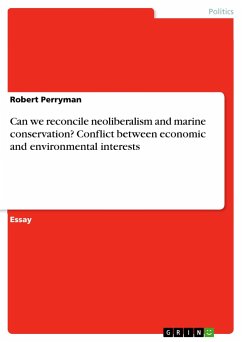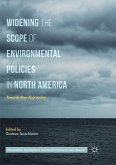Essay from the year 2013 in the subject Politics - Environmental Policy, grade: 100.00, , course: EMBC - Neoliberalism and Conservation, language: English, abstract: Neoliberalist economic policy is one of the main driving forces in world governance in the 21st Century. Unfortunately, its attributes (individual property rights, unrestrained competition, deregulation, privatisation, short-term profit, risk-propensity, lack of safeguards, globalisation) seem to be completely at odds with environmental sustainability. Neoliberal policy may be the major reason for the failure of governments to form proper environmental protection guarantees for the security of future generations. This is particularly apparent in the context of climate change, where corporate and environmental interests consistently clash, and fisheries, where the commercialization of species may threaten future food security. In this essay, I ask if it is possible to reconcile neoliberalism with marine conservation, with focus on fisheries management. I begin by describing failures to protect natural environments, and the particular characteristics of the marine realm and of neoliberalism that are of relevance in the conflict between economic and environmental interests. I go on to explain the interplay between these factors, and the effect of resulting policies on environmental sustainability. I consider the role of the valuation of natural capital as a major area of debate in terms of the possibility for reconciliation.
Hinweis: Dieser Artikel kann nur an eine deutsche Lieferadresse ausgeliefert werden.
Hinweis: Dieser Artikel kann nur an eine deutsche Lieferadresse ausgeliefert werden.








